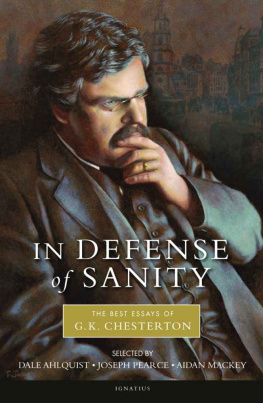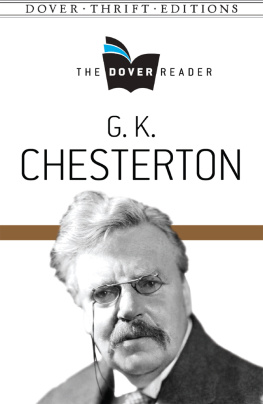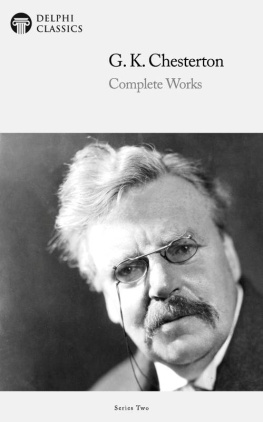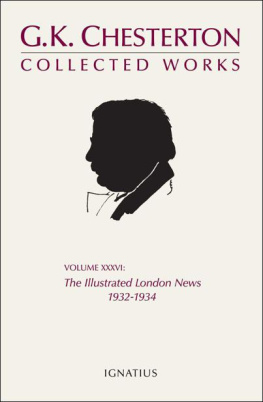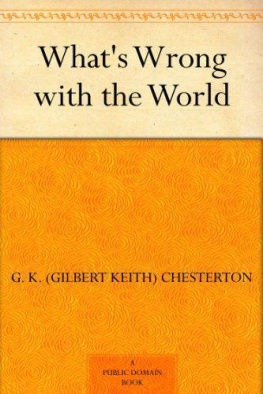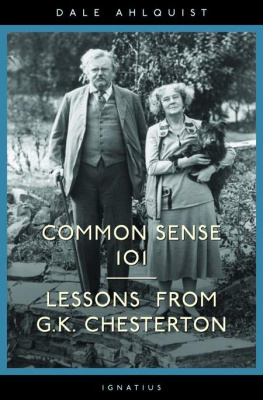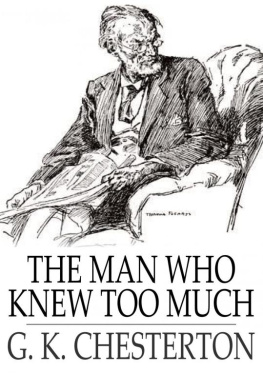In Defense of Sanity
In Defense of Sanity
The Best Essays of G. K. Chesterton
Selected by Dale Ahlquist, Joseph Pearce,
and Aidan Mackey
IGNATIUS PRESS SAN FRANCISCO
Reprinted by permission of A. P. Watt, London
Cover art:
Astonished at the World by Timothy Jones
2011 by Timothy Jones
Photograph courtesy of the artist
Cover design by John Herreid
2011 by Ignatius Press, San Francisco
All rights reserved
ISBN 978-1-58617-489-7
Library of Congress Control Number 2011926404
Printed in the United States of America
CONTENTS
Introduction to The Defendant (The Defendant , 1901)
A Defence of Skeletons (The Defendant , 1901)
On Certain Modern Writers and the Institution of the Family ( Heretics , 1905)
On Running After Ones Hat ( All Things Considered , 1908)
Woman (All Things Considered , 1908)
A Piece of Chalk ( Tremendous Trifles , 1909)
What I Found in My Pocket ( Tremendous Trifles , 1909)
On Lying in Bed ( Tremendous Trifles , 1909)
The Diabolist ( Tremendous Trifles , 1909)
The Twelve Men ( Tremendous Trifles , 1909)
The Shop of Ghosts ( Tremendous Trifles , 1909)
The Romantic in the Rain ( A Miscellany of Men , 1912)
The Mad Official (A Miscellany of Men , 1912)
The Mystagogue ( A Miscellany of Men , 1912)
The Architect of Spears ( A Miscellany of Men , 1912)
Dont ( Daily News , May 7, 1910)
The Mystery of the Mystics ( Daily News , August 30, 1901)
. A Much Repeated Repetition ( Daily News , March 26, 1904)
The Maxims of Maxim ( Daily News , February 25, 1905)
The Book of Job ( GKC as MC , 1929)
Cheese ( Alarms and Discursions , 1910)
On Gargoyles ( Alarms and Discursions , 1910)
The Fading Fireworks ( Alarms and Discursions , 1910)
The Furrows ( Alarms and Discursions , 1910)
The Meaning of Dreams ( Lunacy and Letters , 1958)
On Being Moved ( Lunacy and Letters , 1958)
The Pickwick Papers ( Appreciations and Criticisms of the Works of Charles Dickens , 1911)
The Bluff of the Big Shops ( The Outline of Sanity , 1926)
On Architecture ( Generally Speaking , 1928)
On Shakespeare ( Generally Speaking , 1928)
The Slavery of Free Verse ( Fancies vs. Fads , 1923)
Turning Inside Out ( Fancies vs. Fads , 1923)
On Turnpikes and Medivalism ( All I Survey , 1933)
The Drift from Domesticity ( The Thing , 1929)
On Vulgarity ( Come to Think of It , 1930)
On a Humiliating Heresy ( Come to Think of It , 1930)
On Original Sin ( Come to Think of It , 1930)
On Jane Austen in the General Election ( Come to Think of It , 1930)
On Essays ( Come to Think of It , 1930)
On Evil Euphemisms ( Come to Think of It , 1932)
A Plea for Prohibition ( Sidelights , 1932)
The American Ideal ( Sidelights , 1932)
Marriage and the Modern Mind ( Sidelights , 1932)
Magic and Fantasy in Fiction ( Sidelights , 1932)
On the New Prudery ( Avowals and Denials , 1934)
On the Return of the Barbarian ( Avowals and Denials , 1934)
On Man: Heir of All the Ages ( Avowals and Denials , 1934)
On the Instability of the State ( Avowals and Denials , 1934)
The Romance of Childhood. ( All is Grist , 1931)
The Surrender upon Sex ( The Well and the Shallows , 1935)
Reflections on a Rotten Apple (The Well and the Shallows , 1935)
Babies and Distributism ( The Well and the Shallows , 1935)
The Rout of Reason ( Where Are the Dead ? 1928)
Mary Queen of Scots ( Revaluations , 1931)
George MacDonald ( GKC as MC , 1929)
Tolerating Other Religions ( Illustrated London News , May 31, 1913)
The Efficiency of the Police ( Illustrated London News , April 1, 1922)
About Beliefs ( As I Was Saying , 1936)
The Common Man ( The Common Man , 1950)
Two Stubborn Pieces of Iron ( The Common Man , 1950)
The Revival of PhilosophyWhy? (The Common Man , 1950)
If I Had Only One Sermon to Preach ( The Common Man , 1950)
Scipio and the Children ( The Spice of Life , 1964)
The Philosophy of Islands ( The Spice of Life , 1964)
The Artistic Side ( The Coloured Lands , 1938)
What Is Right with the World ( The Apostle and the Wild Ducks , 1975)
The Spice of Life ( The Spice of Life , 1964)
FOREWORD
Aidan Mackey
The essay is, for the moment, perhaps the most neglected literary form. I say for the moment because unless the moral and literary decadence of our day proves to be irreversible, the essay will eventually spring back into vigorous new life. The best essays have given us such a richness of erudition, elegance, wit, information, and sheer high bubbling fun that we must know beyond doubt that the essay will not perish.
It is with no disrespect at all to the classic masters of the formAddison, Steele, Hazlitt, Arnold, Dr. Johnson, and Charles Lambthat I declare my own high indebtedness to the essayists of the twentieth century, especially Robert Lynd, Belloc, E. V. Lucas (who, in addition to writing his own radiant essays, thought up the witty titles for some of G. K. Chestertons own collections of the form: Alarms and Discursions, Tremendous Trifles, Come to Think of It, A Shilling for My Thoughts , and others), andthe essayist most recent so far as my own knowledge goesBernard Levin, who died in 2004 and whose memory I salute.
It is, though, with Chesterton himself that this volume is concerned. After my boyhood introduction to him through The Man Who Was Thursday , I next discovered his essays and was, at the age of fourteen, ushered into a new and more spacious sphere of literary experience than that offered by the yarns of boys adventures, upon which I had previously fed.
Later, in my days as a schoolmaster, I had the pleasure and the fun of introducing many twelve- and thirteen-year-old pupils to my slightly abridged versions of a few of those illuminating pieces. A Piece of Chalk was always popular, as was The Twelve Men. I have long maintained that we frequently and culpably underestimate the ability of young people to understand adult concepts, provided that we explain and discuss them lucidly.
But the most rewarding essay to my charges seemed always to be What I Found in My Pocket, in which G. K. C. finds himself in a railway compartment without books or newspapers. The hearts of my pupils were won by the account of Chesterton being reduced to searching his pockets and unearthing tram tickets, upon which were short... scientific essays about some kind of pill, and a box of matches that prompted him to meditate on fire, which is stronger even than steel, the old, fierce female thing we all love, but dare not touch.
Then, especially enjoyed by the boys, came the passage: The next thing that I took out was a pocket-knife.... I saw a vague and violent battle, in which the stone axes broke and stone knives were splintered against something shining and new in the hand of one desperate man.... I saw all the swords of Feudal and all the wheels of Industrial war. For the knife is only a short sword; and the pocket-knife is a secret sword .
The emphasis in that last sentence is mine. As for the whole passage, many times I have seen its effect upon the young imagination and have myself been warmed and rewarded by it.
If you, reader of this volume, are fortunate enough to have contact with young readers of our own day, do, I implore you, introduce them to the essay formand there is no better place to start than with G. K. Chesterton.
PREFACE
Joseph Pearce
I am interested in getting to know the works of G. K. Chesterton. Could you recommend a good place to start? When I hear this questionone of the most frequently asked during my travels on the lecture circuitI experience a sinking feeling deep inside. I am obviously not disappointed that my interlocutor desires to get to know Chesterton. (Perish the thought!) On the contrary, I am always delighted to learn of another would-be convert to the magic of G. K. C. The truth is that the sinking feeling overcomes me in spite of such delight, souring its sweetness. I have come to realise that this seemingly inexplicable sense of apprehension is caused by the knowledge that I have just been asked a question that is much easier to ask than it is to answer.
Next page
